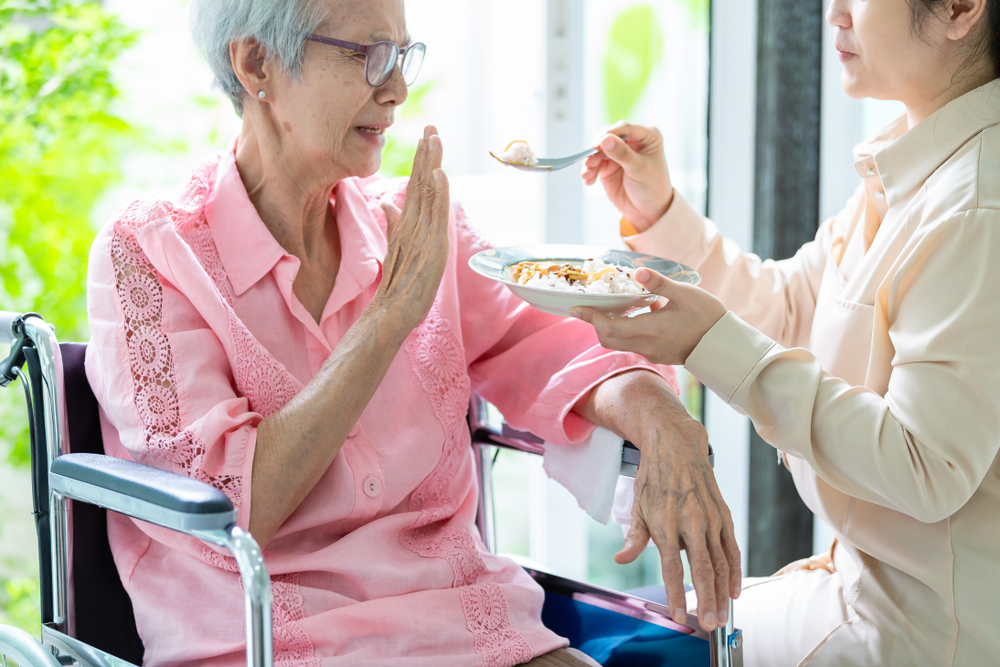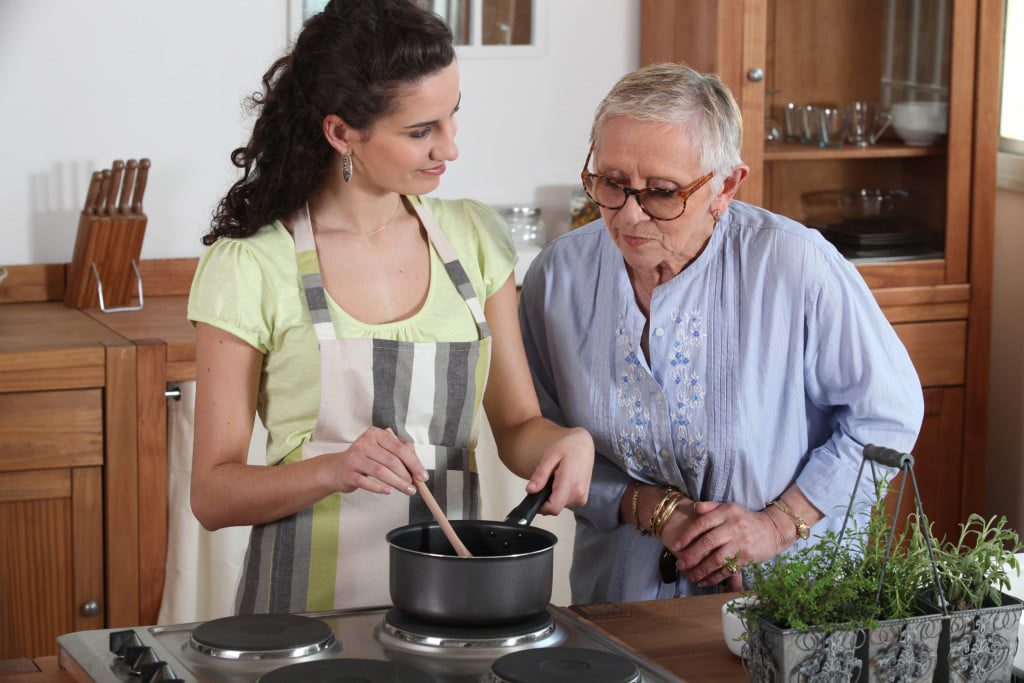
Updated February 18, 2021
Getting enough nutrition is critical at every stage of life. Yet, many seniors don’t eat as much as they should.
When this happens, it has negative implications for overall health and increases the risk of nutrient deficiencies.
In the long-term, such issues may increase the risk of disease development and loss of muscle. This makes it critical that seniors get all of their nutrients.
So, how do you help seniors who are refusing to eat?
The first step is to figure out why.
Why Seniors May Not Eat
There are multiple reasons why seniors will refuse to eat. To resolve the situation, you need to understand which of these apply and what you can do.
Difficulty Chewing or Swallowing

Oral health problems can make eating unappealing in a range of ways. Some seniors find that they have difficulty chewing, while others may have challenges swallowing food.
Regular dental checkups can reduce the risk of these issues and ensure that any problems are tackled early on.
But, you can also make food easier for seniors to eat.
- For example, cooked vegetables are softer than raw ones.
- Likewise, recipes with ground meat will always be easier to eat than those that use pork chops or steak.
- Fish is another good soft ingredient and you can also rely on sauces to make food softer and moister.
- In fact, there are many good soft foods for seniors along with plenty of delicious recipes seniors can eat.
If chewing is a severe issue, you may be able to rely on recipes that are softer still, including meal replacement shakes. However, it’s important to talk to the senior’s physician before going this route.
Such products do have some advantages but many are loaded with sugar as well. Additionally, there is still more nutrition in real food, which should always be the first choice.
Decreased Sense of Taste, Smell and/or Vision
Our senses play a key role in eating – much more than we even realize. These aspects are a key reason why we enjoy our food so much.
Without them, food tends to be bland and boring. As people age, their senses often decline. This can make food much less interesting and can also reduce appetite as a result.
One way around this is to increase the flavor profile of the food. For example, you can rely on herbs and spices to increase the flavor of your meals. You might also increase your use of vegetables, which can make the texture and the flavor of meals more interesting.
In fact, food for seniors can be tasty and interesting, even for seniors who have multiple health conditions.
Simply making the meals look more interesting can also help, especially for seniors with vision problems. Colorful ingredients are particularly powerful along with varying the recipes that you use.
Another technique is to change the way you present food. Often it just takes another step or two more to make food look good on the plate and this can make it more interesting to eat.
Not Wanting to Cook

Many seniors will gladly eat anything that is made for them but don’t want to cook for themselves. In some cases, they may want to do so in theory but tend to push the process off.
For example, I’ve seen seniors convince themselves that they aren’t hungry, because they don’t want to stop what they’re doing – or because cooking just feels like too much effort.
Some may also be refusing to eat meals and will rely on candy and snacks to sate their appetite instead.
If the senior is living with you, the answer may be to prepare meals for them. This could even include making them a packed lunch for during the day – or cooking a hot lunch.
If they don’t live with you, then the process becomes more complicated.
Services like Meals on Wheels can help and there are also paid meal delivery services. Alternatively, you can turn to in-home care or a related service, which can act as a source of companionship as well.
Eating Between Meals
Some seniors get into the habit of eating between meals. This can often happen because of emotional eating or boredom. Additionally, seniors with short-term memory issues may end up having more snacks than they remember.
This pattern means that seniors often won’t be hungry at mealtime.
To improve this situation, you can find ways to decrease the snacking and/or ensure that the foods chosen are healthier. This could include buying fewer unhealthy snacks at the grocery store and making healthier ones more readily available.
Likewise, you could take steps to make healthy snacks more appealing. There is a good list of options at Senior Care Center that can get you started. Focusing on nutrient-dense meals and snacks, including ones that are high in protein can play a key role as well.
Snacks like this may not help with hunger at meal times but they can ensure that the senior is getting the nutrients that they need.
In some cases, you may even find that many small meals in a day works better than three large ones. This may make it easier to get around snacking behavior and means that the senior has smaller meals to manage at any given time.
Doesn’t Like A Specific Meal Time
Most of us have a favorite meal time (like dinner) and we might also have a meal we hate. For example, some people don’t want to eat first thing in the morning, which is why breakfast skipping is such a common pattern.
The same is true for seniors.
If you can work out the meals that they like the most and the least, you can start to plan around this.
For example, if the senior loves dinner, make sure that dinner has more nutrients. In contrast, if they don’t enjoy breakfast, focus on making the meal lighter and easier to eat.
Lack of Appetite
Appetite often decreases as people age, especially for anyone who uses less energy on a day-to-day basis. When this happens, seniors often won’t want to eat.
The approach of snacks throughout the day can help, especially if you are relying on snacks that are nutrient-dense and are also appealing.
Additionally, it’s important to not place too much pressure on the senior. Instead, rely on a food first approach and aim to encourage, rather than discourage.
Doing so may involve praising the senior for what they do eat, even if it isn’t as much as you would like. It’s also worth taking away any uneaten food, as keeping it out can promote feelings of guilt.
Practical Solutions for Seniors Who Are Refusing to Eat

All of the areas above are approaches that can help. But, finding the best solution will still take time – and patience.
For one thing, every person is different. This means they have their own set of needs and they’ll vary in how they respond to your attempts. As a result, the solutions that work for one person may not work for another.
Additionally, some parents are stubborn and many elderly parents also refuse help, even when they do actually need it. Focusing on empowering seniors can help in this area.
Many seniors may also face multiple issues.
For example, they may have a decreased sense of taste, an unwillingness to cook and a tendency to fill up on sugar. Solving this problem would require finding a solution to all three areas at the same time.
Such a solution could involve cooking meals for the senior, decreasing the availability of sweets and making sure that the food is interesting and high in flavor. But, that approach involves considerable work on the part of the caregiver. As a result, it may not be viable in all situations.
The combination of issues would also make solutions like Meals on Wheels difficult – as those meals are often bland (depending on where you live). Resolving the problem isn’t impossible. Instead, you may simply need to try multiple approaches and tailor what you do toward the senior’s needs.
The areas discussed above are key ways to do just that.

Leave a Reply